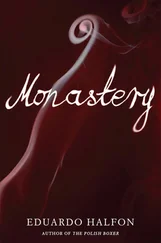Eduardo Halfon - The Polish Boxer
Здесь есть возможность читать онлайн «Eduardo Halfon - The Polish Boxer» весь текст электронной книги совершенно бесплатно (целиком полную версию без сокращений). В некоторых случаях можно слушать аудио, скачать через торрент в формате fb2 и присутствует краткое содержание. Год выпуска: 2012, Издательство: Bellevue Literary Press, Жанр: Современная проза, на английском языке. Описание произведения, (предисловие) а так же отзывы посетителей доступны на портале библиотеки ЛибКат.
- Название:The Polish Boxer
- Автор:
- Издательство:Bellevue Literary Press
- Жанр:
- Год:2012
- ISBN:нет данных
- Рейтинг книги:4 / 5. Голосов: 1
-
Избранное:Добавить в избранное
- Отзывы:
-
Ваша оценка:
- 80
- 1
- 2
- 3
- 4
- 5
The Polish Boxer: краткое содержание, описание и аннотация
Предлагаем к чтению аннотацию, описание, краткое содержание или предисловие (зависит от того, что написал сам автор книги «The Polish Boxer»). Если вы не нашли необходимую информацию о книге — напишите в комментариях, мы постараемся отыскать её.
marks the debut of a major new Latin American voice in English.
The Polish Boxer — читать онлайн бесплатно полную книгу (весь текст) целиком
Ниже представлен текст книги, разбитый по страницам. Система сохранения места последней прочитанной страницы, позволяет с удобством читать онлайн бесплатно книгу «The Polish Boxer», без необходимости каждый раз заново искать на чём Вы остановились. Поставьте закладку, и сможете в любой момент перейти на страницу, на которой закончили чтение.
Интервал:
Закладка:
You should put this on, the man said to me somewhat brusquely, handing me a white skullcap. Out of respect, he said as I stood looking at the white skullcap in my hand. Kipa, in Hebrew. Yarmulke, in Yiddish. Respect for whom? I thought of asking. But I just put it on. Sit, sit, he said. He moved to one side and pointed to the chair and I thanked him. The chair was warm.
My grandmother whispered something, as though to herself, as though merely to make her presence felt, and carried on lightly shaking her head. She remained anchored to my hand. The bag of ice still sat precariously on her knee. She had the dull, abstracted gaze of someone who had been given a few sedatives.
Shlomo, said the man. I looked up. I tried to focus but all I could see was that his reddish beard, around his mouth, was full of biscuit crumbs. I’m Shlomo, the rabbi, the man said. We haven’t met, he said, you and I, and maybe he noticed that I was looking at his dirty, matted beard, because he immediately rubbed it and crumbs fell like snowflakes onto the carpet. But I know who you are. The grandson, he said. The artist, he said, and I felt a bit insulted and didn’t know if he was confusing me with my brother, but I was too lazy to ask or correct him, so I just said yeah, that’s me.
He spoke slowly, the rabbi, haltingly, with a heavy foreign accent. Possibly a Yiddish or an Israeli accent. It occurred to me that maybe he was the new rabbi, since in a Jewish community as small as Guatemala’s (a hundred families, they usually say), the rabbis are always imported. I remember that when I was a child, there was a rabbi from Miami Beach, more serious than Orthodox, who always had a runny nose, was always clutching a damp handkerchief, and who always said the prayers in English. And a rabbi from Panama who ran off with stolen money. And one from Mexico who only showed up every now and then, for holidays, and another one, also from Mexico, who used to sweat so much when he was praying that he’d have to change his skullcap halfway through the service. But the vast majority of the rabbis, as I remember it, were from Argentina. One, who was always extolling the virtues of the Boca Juniors soccer team and preaching against mixed marriages, got a local Catholic girl pregnant and later married her (own goal, as my grandfather rather philosophically put it). Another Argentinian, a nice young guy named Carlos, who arrived just in the years when I began to distance myself from Judaism and from my family (you can’t do one without the other), used to talk to me about music and nothing else. I’d begun listening to jazz. He also listened to jazz, or he knew about jazz, or maybe he just knew three or four names and used them as a way of bridging the gap. In any case, I was really mixed up at the time. I was very sensitive about everything and very frustrated by everything. I’d recently left home, which also meant leaving behind my father’s religion and everything about his glass-house world. And I really appreciated the fact that Carlos, instead of pestering me, would just talk about Armstrong and Coltrane and Parker and Monk. All except for the last time I saw him (he later moved to Israel with his family). It was in the street, in front of a kids’ ice-cream parlor. We greeted each other. We chatted a little. I told him what was going on with me, possibly a bit anxiously or unhappily, and so Carlos, out of the blue, asked me if I remembered the story of Abraham. The first Jew, he added, smiling. No, I told him. Well, more or less. Still smiling, he quoted a line from the book of Genesis: Get thee out of thy country, and from thy kindred, and from thy father’s house, unto a land that I will show thee. Lech l’cha, he said in Hebrew, with a wink, and that was all.
My grandmother let go of my hand and shifted slightly and the maroon-and-black-checkered quilt also moved a little, and I thought with a fright that I was about to see the face of my dead grandfather.
My grandmother wanted to say something to me, but the words wouldn’t come to her, or maybe she didn’t know what words to say. I leaned a little closer to her, as though to help. Oh Eduardito, she whispered, and then, with a half-smile, added: That was what your grandfather used to call you, wasn’t it? And she repeated the diminutive of my name a couple of times, her jaw trembling, her voice gradually fading, her pale blue eyes sinking floorward again. I considered her face. A sweet lady, my grandmother, very compassionate and good-natured, but overly sentimental as well. She told me once that her father, my great-grandfather, a Jew from Damascus who lost all the family’s money at cards, would never allow his children to kiss him except on the hand. Nothing else. Just kiss him on the hand. Never, my grandmother said with an amazing sadness, I never got to embrace my father.
Far off, the growing murmur of visitors could be heard in the dining and living rooms.
The rabbi was talking to my grandmother about Noah and the Flood and a rainbow among the clouds and I began looking around my grandparents’ bedroom. There, next to the bed, still hung the only photo my grandfather had managed to keep of his family in Łódź, all of them dead in ghettos or concentration camps: his sisters Raquel (Ula) and Raizel (Rushka), his younger brother Salomón (Zalman), his parents Samuel (tailor) and Masha (washerwoman). Gray, bland faces, all too distant for me. I thought about the last time I’d said to my grandfather that I wanted to travel to Poland, to Łódź, and about his reaction that had bordered on violent. What do you want to go to Poland for? he said. You mustn’t go to Poland, he said, but later he jotted down for me on a small piece of yellow paper (as though it were a small inheritance for a grandson, or a key to a long-buried family secret) his address in Łódź, in precise detail: ground floor of the building on the corner of Źeromskiego and Persego Maja, number 16, near the Zielony Rynek market, near Poniatowskiego Park. And I thought about the number tattooed on my grandfather’s forearm, 69752, a faded green number that as children he told us was his phone number, and he’d smile, saying he had it tattooed there so he wouldn’t forget it. And I thought about Rena Kornreich, another Polish survivor of Auschwitz, who years later, as she herself told it, had her number surgically removed, 1716, but instead of throwing it away, she had kept that small piece of skin, that small piece of herself, in a bottle of formaldehyde. And I thought about Primo Levi, about the number tattooed on Primo Levi’s forearm, 174517, and how, whereas my grandfather avoided his number, hid it, made a joke out of it so as not to acknowledge it, and whereas Mrs. Kornreich tore hers off, Primo Levi left instructions for his to be engraved on his tomb. And so there, on a tombstone in the Jewish cemetery in Turin, both his name and his number are engraved: his family name and that other, more sinister name. Both, I suppose, like it or not, intrinsic elements of his identity.
Now the rabbi was talking to my grandmother (who was taking no notice) about some pact of God’s (Hashem, he kept saying) after the Flood, and I went on studying my grandparents’ bedroom. I noticed three things that were out of place. On my grandfather’s bedside table, a candle was burning; the wall mirror above the dresser was covered with an enormous white sheet; the window, always kept shut because of the draft, was wide open. Shlomo had finished his little homily now and I asked him about these three things. Still standing, he seemed to get a real kick out of being able to explain them to me. Whispering, he said that when a Jew dies, a candle is lit because the flame dispels negative energies; that when a Jew dies, all the mirrors in the house are covered so as to eliminate vanities; that when a Jew dies, a window is opened in the room where his body lies, symbolically, so that, as it says in the Torah, in the Book of Daniel, his body might be aided in its ascent to heaven. Shlomo smiled beneficently and topped it off with a few words in Hebrew and I could have sworn I heard harps. He suddenly came a little closer to me, leaned in a little closer. I thought he was about to tell me something else, something very ceremonious and deeply Jewish. I gritted my teeth. Yesterday, he whispered, I came back from Tikal.
Читать дальшеИнтервал:
Закладка:
Похожие книги на «The Polish Boxer»
Представляем Вашему вниманию похожие книги на «The Polish Boxer» списком для выбора. Мы отобрали схожую по названию и смыслу литературу в надежде предоставить читателям больше вариантов отыскать новые, интересные, ещё непрочитанные произведения.
Обсуждение, отзывы о книге «The Polish Boxer» и просто собственные мнения читателей. Оставьте ваши комментарии, напишите, что Вы думаете о произведении, его смысле или главных героях. Укажите что конкретно понравилось, а что нет, и почему Вы так считаете.












